Deck 6: Orthogonality and Least Squares
Question
Question
Question
Question
Question
Question
Question
Question
Question
Question
Question
Question
Question
Question
Question
Question
Question
Question
Question
Question
Question
Question
Question
Question
Question
Question
Question
Question
Question
Question
Question
Question
Question
Question
Question
Question
Question
Question
Question
Question
Question
Question
Question
Question

Unlock Deck
Sign up to unlock the cards in this deck!
Unlock Deck
Unlock Deck
1/44
Play
Full screen (f)
Deck 6: Orthogonality and Least Squares
1
Find the distance between the two vectors.


A
2
Compute the dot product u · v.


A
3
Find the distance between the two vectors.


A
4
Find the distance between the two vectors.



Unlock Deck
Unlock for access to all 44 flashcards in this deck.
Unlock Deck
k this deck
5
Compute the dot product u · v.



Unlock Deck
Unlock for access to all 44 flashcards in this deck.
Unlock Deck
k this deck
6
Find the distance between the two vectors.



Unlock Deck
Unlock for access to all 44 flashcards in this deck.
Unlock Deck
k this deck
7
Determine whether the set of vectors is orthogonal.



Unlock Deck
Unlock for access to all 44 flashcards in this deck.
Unlock Deck
k this deck
8
Compute the dot product u · v.



Unlock Deck
Unlock for access to all 44 flashcards in this deck.
Unlock Deck
k this deck
9
Find the distance between the two vectors.



Unlock Deck
Unlock for access to all 44 flashcards in this deck.
Unlock Deck
k this deck
10
Express the vector x as a linear combination of the uʹs.



Unlock Deck
Unlock for access to all 44 flashcards in this deck.
Unlock Deck
k this deck
11
Find a unit vector in the direction of the given vector.
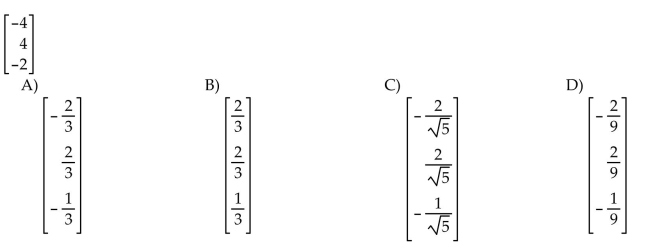


Unlock Deck
Unlock for access to all 44 flashcards in this deck.
Unlock Deck
k this deck
12
Express the vector x as a linear combination of the uʹs.



Unlock Deck
Unlock for access to all 44 flashcards in this deck.
Unlock Deck
k this deck
13
Compute the dot product u · v.



Unlock Deck
Unlock for access to all 44 flashcards in this deck.
Unlock Deck
k this deck
14
Compute the dot product u · v.
 )2
)2
 )2
)2
Unlock Deck
Unlock for access to all 44 flashcards in this deck.
Unlock Deck
k this deck
15
Find a unit vector in the direction of the given vector.



Unlock Deck
Unlock for access to all 44 flashcards in this deck.
Unlock Deck
k this deck
16
Find the orthogonal projection of y onto u.



Unlock Deck
Unlock for access to all 44 flashcards in this deck.
Unlock Deck
k this deck
17
Find the distance between the two vectors.



Unlock Deck
Unlock for access to all 44 flashcards in this deck.
Unlock Deck
k this deck
18
Determine whether the set of vectors is orthogonal.



Unlock Deck
Unlock for access to all 44 flashcards in this deck.
Unlock Deck
k this deck
19
Compute the dot product u · v.



Unlock Deck
Unlock for access to all 44 flashcards in this deck.
Unlock Deck
k this deck
20
Find the distance between the two vectors.



Unlock Deck
Unlock for access to all 44 flashcards in this deck.
Unlock Deck
k this deck
21
Solve the problem.



Unlock Deck
Unlock for access to all 44 flashcards in this deck.
Unlock Deck
k this deck
22
Solve the problem.



Unlock Deck
Unlock for access to all 44 flashcards in this deck.
Unlock Deck
k this deck
23

Data points: (2, 1), (3, 2), (7, 3), (8, 1)33)


Unlock Deck
Unlock for access to all 44 flashcards in this deck.
Unlock Deck
k this deck
24
Find a least-squares solution of the inconsistent system Ax = b.



Unlock Deck
Unlock for access to all 44 flashcards in this deck.
Unlock Deck
k this deck
25
Let W be the subspace spanned by the uʹs. Write y as the sum of a vector in W and a vector orthogonal to W.



Unlock Deck
Unlock for access to all 44 flashcards in this deck.
Unlock Deck
k this deck
26
Find the orthogonal projection of y onto u.



Unlock Deck
Unlock for access to all 44 flashcards in this deck.
Unlock Deck
k this deck
27
The given set is a basis for a subspace W. Use the Gram-Schmidt process to produce an orthogonal basis for W.



Unlock Deck
Unlock for access to all 44 flashcards in this deck.
Unlock Deck
k this deck
28
Write the word or phrase that best completes each statement or answers the question.



Unlock Deck
Unlock for access to all 44 flashcards in this deck.
Unlock Deck
k this deck
29
The given set is a basis for a subspace W. Use the Gram-Schmidt process to produce an orthogonal basis for W.



Unlock Deck
Unlock for access to all 44 flashcards in this deck.
Unlock Deck
k this deck
30
Compute the length of the given vector.



Unlock Deck
Unlock for access to all 44 flashcards in this deck.
Unlock Deck
k this deck
31
Find a QR factorization of the matrix A.
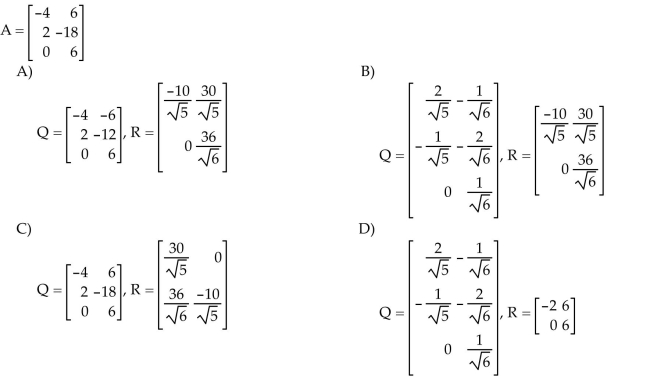
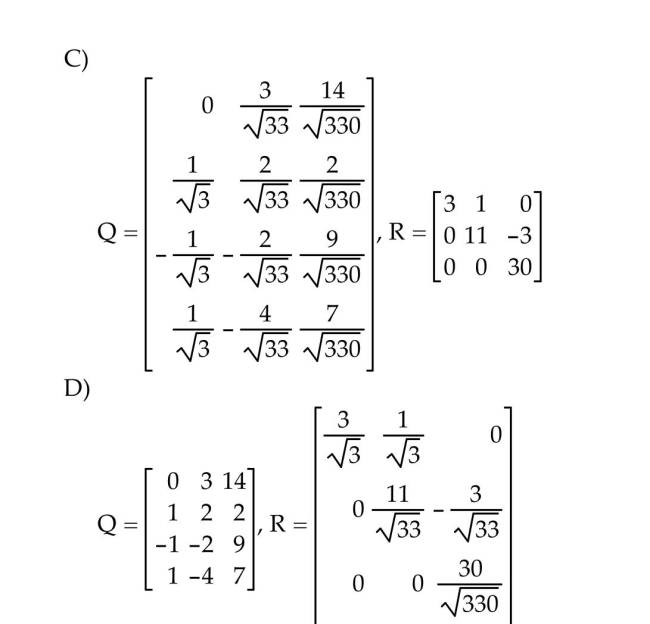



Unlock Deck
Unlock for access to all 44 flashcards in this deck.
Unlock Deck
k this deck
32



Unlock Deck
Unlock for access to all 44 flashcards in this deck.
Unlock Deck
k this deck
33
Find a least-squares solution of the inconsistent system Ax = b.
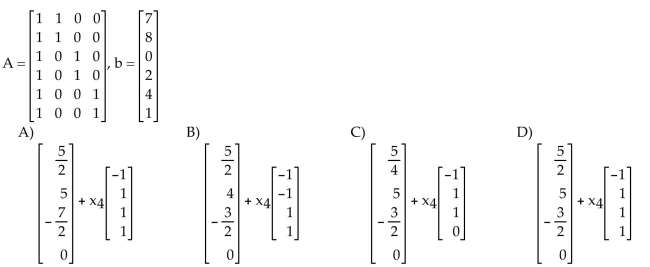


Unlock Deck
Unlock for access to all 44 flashcards in this deck.
Unlock Deck
k this deck
34
Compute the length of the given vector.



Unlock Deck
Unlock for access to all 44 flashcards in this deck.
Unlock Deck
k this deck
35
Solve the problem.
Data points: (5, -3), (2, 2), (4, 3), (5, 1)
Data points: (5, -3), (2, 2), (4, 3), (5, 1)


Unlock Deck
Unlock for access to all 44 flashcards in this deck.
Unlock Deck
k this deck
36
Let W be the subspace spanned by the uʹs. Write y as the sum of a vector in W and a vector orthogonal to W.



Unlock Deck
Unlock for access to all 44 flashcards in this deck.
Unlock Deck
k this deck
37
Find a QR factorization of the matrix A.
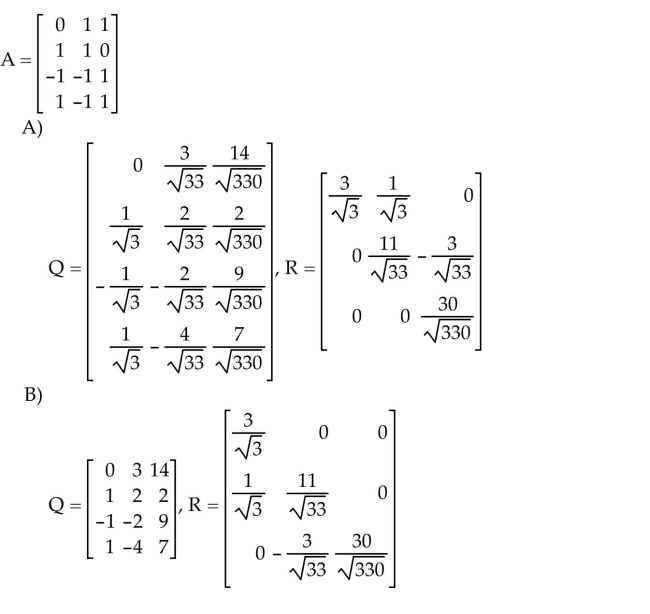


Unlock Deck
Unlock for access to all 44 flashcards in this deck.
Unlock Deck
k this deck
38
Given A and b, determine the least-squares error in the least-squares solution of Ax = b.



Unlock Deck
Unlock for access to all 44 flashcards in this deck.
Unlock Deck
k this deck
39
Write the word or phrase that best completes each statement or answers the question.



Unlock Deck
Unlock for access to all 44 flashcards in this deck.
Unlock Deck
k this deck
40



Unlock Deck
Unlock for access to all 44 flashcards in this deck.
Unlock Deck
k this deck
41
Solve the problem.
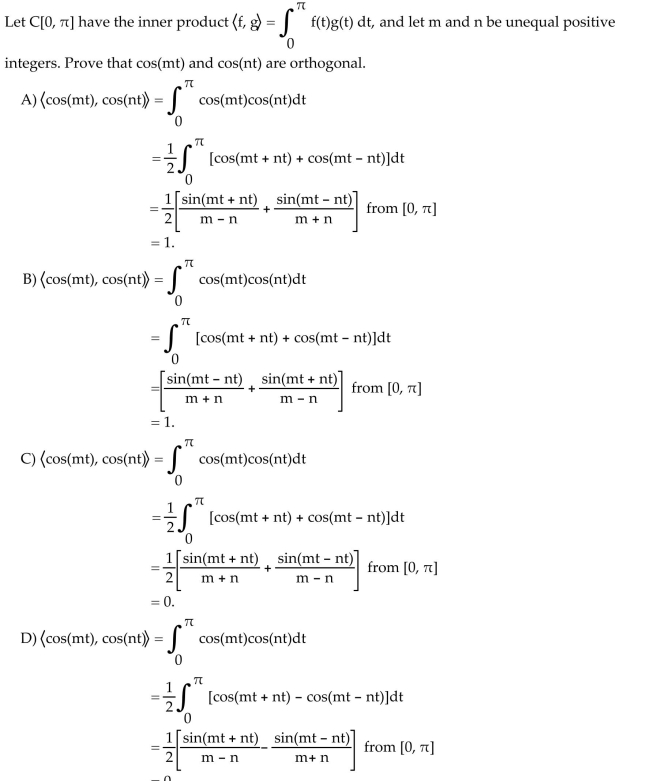


Unlock Deck
Unlock for access to all 44 flashcards in this deck.
Unlock Deck
k this deck
42
Solve the problem.



Unlock Deck
Unlock for access to all 44 flashcards in this deck.
Unlock Deck
k this deck
43

Given: The data points (-2, 2), (-1, 5), (0, 5), (1, 3), (2, 5). 44) Suppose the errors in measuring the y-values of the last two data points are greater than for the
Other points. Weight these data points twice as much as the rest of the data.


Unlock Deck
Unlock for access to all 44 flashcards in this deck.
Unlock Deck
k this deck
44

Given: The data points (-3, 2), (-2, 5), (0, 5), (2, 3), (3, 3). Suppose the errors in measuring the y-values of the last two data points are greater than for the
Other points. Weight these data points half as much as the rest of the data.


Unlock Deck
Unlock for access to all 44 flashcards in this deck.
Unlock Deck
k this deck


